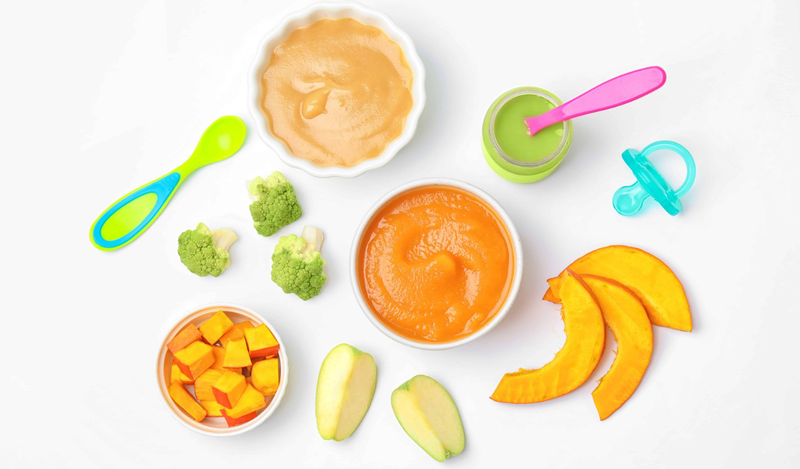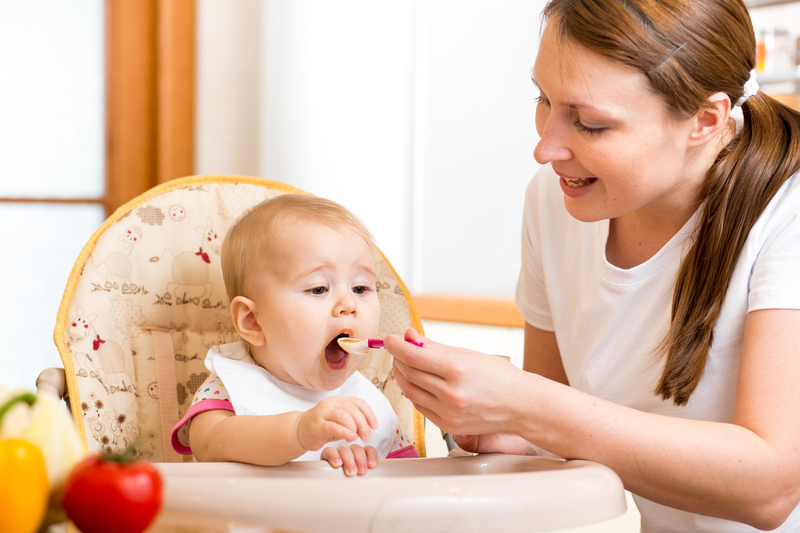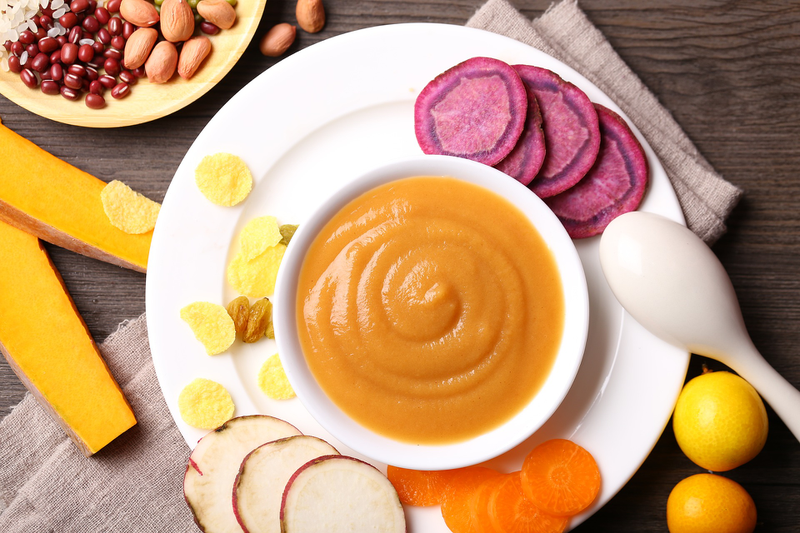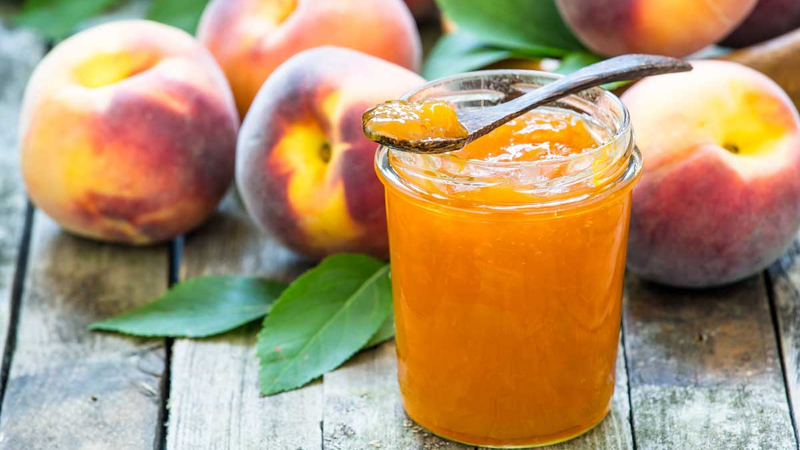Fruit is very good for health, not only for adults but also for children. However, when is the best time to feed your baby fruit? The following article will help you answer the above question and know how to feed your baby fruit properly.
When to feed your baby fruit is something that many parents are interested in because this can affect the child’s digestive system. To know when is the most appropriate time to feed your child fruit, please follow the sharing below.
Answer: When should you feed your baby fruit?
Children should be exclusively breastfed for the first 6 months of life is the advice from experts because at this time, the child’s digestive system is not yet fully developed, is still weak and not ready to receive strange foods other than breast milk, including fruit. So when should you feed your baby fruit? Mothers should only let their babies practice eating fruit when they are about 6 months old or older.
Sharing more about when to feed children fruit, nutritionists encourage parents to feed their children fruit about 30-40 minutes after the main meal or can separate fruit into a snack and eat 2-3 hours after the main meal. The reason is that if you feed your child fruit right before the meal, it will make the child full and eat less or even not eat at the main meal. On the contrary, if you feed your child fruit right after the main meal, it can cause indigestion, bloating and even constipation due to some substances in the fruit.

When should I feed my baby fruit? I should only feed my baby fruit after 6 months of age.
When is the best time to feed your baby fruit? Because fruit often has a high fructose content, the best time for your baby to eat fruit is in the morning after a long night’s sleep. If your baby eats fruit too close to bedtime, it will cause blood sugar levels to rise, which can easily disrupt your baby’s sleep.
Fruit is easily digested and converted into nutrients through the body’s digestive system, so when should you feed your baby fruit? The best time to feed your baby fruit is before your baby takes in energy, specifically before breakfast or before lunch.
After feeding your baby fruit, parents should wait about 1-2 hours for their baby’s body to fully digest it before the main meal. This way of feeding your baby fruit will give your baby enough time to digest, thereby not feeling bloated, full, and the stomach is prepared to receive the next source of food.
Parents should pay attention to never feed their children fruit right in the main meal or with other foods. Although eating fruit salad is very good, if you feed your child fruit with too much food at the same time, it will hinder the child’s digestion process, slow down digestion and make the child uncomfortable. This also applies to fruit smoothies, you should not blend fruit with vegetables, nuts or milk, etc. to avoid putting pressure on the child’s immature digestive system.
Fruit is a food containing many nutrients, fiber and healthy carbohydrates to help the body have enough energy and be healthy, so mothers also need to choose a variety of fruits for their children to provide different nutrients such as avocados containing lots of vitamins E, K, B6, etc. while bananas are rich in potassium, magnesium, etc.

Parents should feed their children fruit 30-45 minutes after the main meal or 2-3 hours before the main meal.
In summary, when should you feed your baby fruit? Parents should feed their baby fruit after 6 months of age and eat it as a snack or 1-2 hours after the main meal, avoiding eating it with the main meal or eating it with other foods that put pressure on your baby’s fragile digestive system. When feeding your baby fruit, you should also vary the types of fruit so that your baby gets used to many foods and is provided with a more diverse source of nutrition.
How to feed your baby fruit properly
In addition to paying attention to when to feed your baby fruit, parents should also feed their baby fruit properly because it is good for their baby’s digestive system and helps them stay healthy. When first feeding your baby fruit, parents should introduce their baby to 2 familiar soft fruits: avocado and banana. Specifically, in the first 2-3 weeks of weaning, you should only feed your baby these 2 types of fruit because they are easy to digest, easy to absorb and less allergenic. From week 4 to 5 onwards, mothers can feed their babies a variety of fruits such as apples, dragon fruit, mangoes, etc., but should still prioritize fruits that are less sweet.
In addition to feeding your baby fruit directly, you can also give your baby fruit juice during or after the main meal. In addition, 3 hours before the main meal, your baby can also drink a little fruit juice, but be careful not to drink too much or drink it instead of water.

You can combine fruits with vegetables to help your baby get used to a wider variety of foods.
Parents can also combine some of the fruits that their baby likes to increase nutrition for their baby. Note that when combining fruits, prioritize fruits that have a certain taste or a stable taste, which will taste better and be more cooperative for the baby. Some fruit combinations you can refer to are avocado and banana, papaya and mango, apple and banana, avocado with pear or apple, etc. In addition, combining fruits and vegetables is also very good for children, specifically orange juice and carrots, guava and banana, pomegranate and apricot, papaya and lemon, etc.
Nutritious fruits for babies
Usually, all fruits are suitable for children because they are natural, unprocessed foods. However, for children who are just starting to eat fruit and are in the process of weaning, mothers should prioritize the following nutritious fruits.
- Bananas: The rich amount of potassium and fiber in bananas is very good for babies, supporting a healthy digestive system and preventing constipation.
- Avocado: Very nutritious with more than 14 vitamins and minerals such as calcium, iron, copper, potassium, zinc, vitamin E, omega-3, … good for the baby’s brain development.
- Apple: Is a popular weaning fruit with high nutritional content, good for the digestive system and helps prevent asthma in children.
- Peach: Has a soft, juicy texture that is easy to eat and provides many nutrients such as vitamin B1, vitamin B2, potassium, iron, … good for the baby’s eyesight and circulatory system.

Peaches are soft and juicy, making them perfect for weaning babies.
Hopefully, through the above article, readers have answered the question of when to feed fruit to children. When feeding children fruit for the first few times, parents should feed them a little at a time and observe their child’s reaction after eating. If they notice that their child has diarrhea, is fussy, or is uncomfortable, they should stop immediately and take their child to a medical facility.





